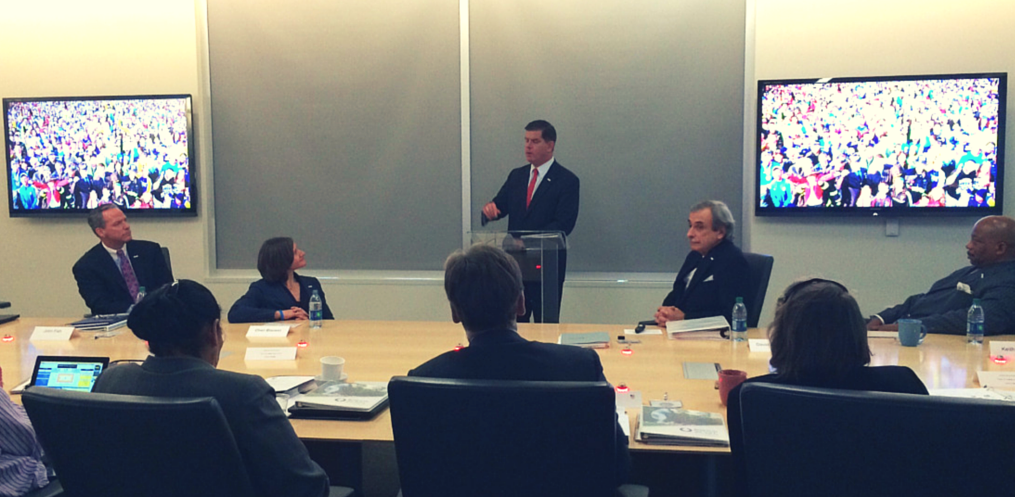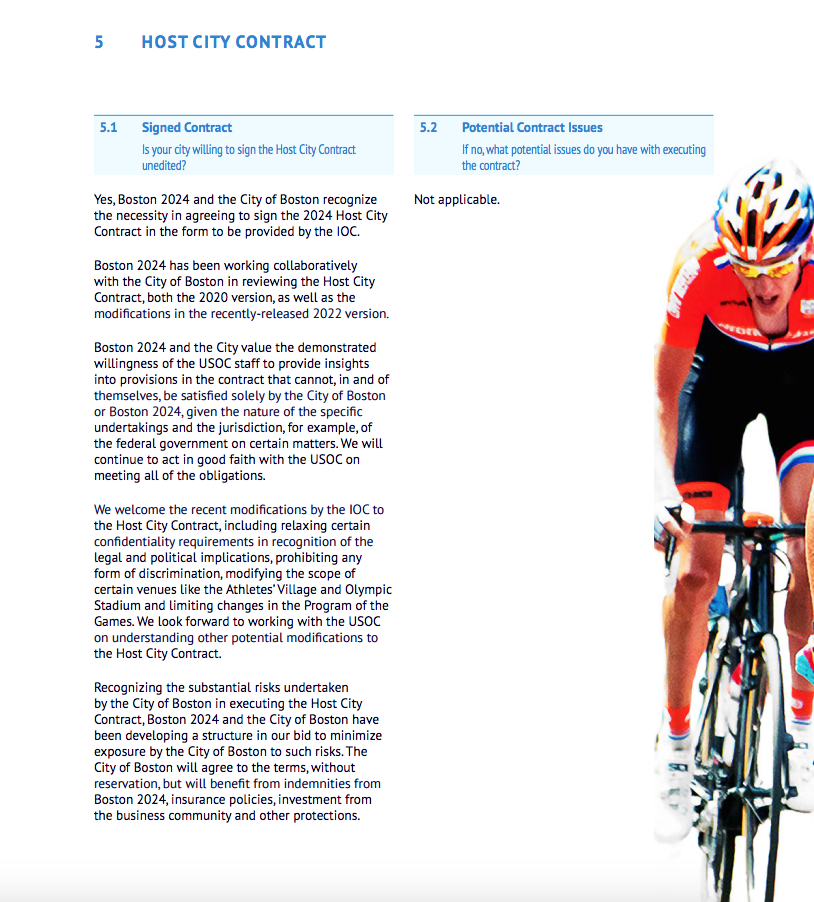
Mayor Marty Walsh, who pitched Boston 2024 to the United States Olympic Committee in December, helped to will the Olympic bid into official existence. Without his initial support, it would never have gotten off the ground in the eyes of the USOC. It was fitting, therefore, that as Walsh was featured so prominently in Boston 2024’s formal birth, so too was he a dominant figure on the day of its death.
Standing at the podium in City Hall on Monday, he declared that “I refuse to commit to signing a guarantee that uses taxpayer dollars to pay for the Olympics.” Within hours, the Boston 2024 bid had been officially pulled by the USOC. The two events were not necessarily cause and effect. Reports indicate that the bid was being pulled regardless of what Mayor Walsh said. Still, Walsh’s words sounded strong.
“I refuse to put Boston on the hook for overruns,” Walsh emphatically said. “And, I refuse to commit to signing a guarantee that uses taxpayer dollars to pay for the Olympics.”
It sounds like a mayor taking a tough new stand against an independent and outside organization that potentially threatened the financial wellbeing of his city. In many ways that was true, indicative of a mayor whose heart has been in the right place as he tries to shield his constituents.
Of course, Walsh wasn’t exactly saying anything new, from the standpoint of refusing to “mortgage the future of the city away.”
After all, this was almost exactly what he said in an interview with WCVB after pitching the bid to the USOC in December.
“I made it perfectly clear to everyone including 2024 that, you know, I’m not going to mortgage the future of the city away here,” Walsh said on December 16 when it appeared Boston was far from the frontrunner in the U.S. race between Boston, Los Angeles, San Francisco and Washington D.C.
In an interview with BostInno in May, Walsh said if the bid put Boston taxpayers on the hook for overruns, that would be a dealbreaker. “That would cause me to say we’re not moving forward,” he said.
Yet there was more to the speech on Monday than the ongoing theme protecting local taxpayers. Walsh was trying to find the right balance in his words, so that he could take a stand while also managing to avoid contradicting multiple agreements he’d previously signed with the USOC.
Careful wording
Walsh never actually said he wouldn’t sign a taxpayer guarantee. He merely said in his address that he wouldn’t be rushed into it. The closing sentence in his statement was this:
“If committing to signing a guarantee today is what is required to move forward then the City of Boston is no longer pursuing the 2024 Olympic and Paralympic Games.”
It’s a carefully crafted choice of words, for several reasons. First, the USOC was not going to make Walsh physically sign the guarantee on Monday (also known as the Host City Contract), because they don’t even have it yet. The Contract won’t be made available until September. And historically, the Contract isn’t signed until a much later date. With that, Walsh could only use the phrase “commit to signing,” instead of just saying “signing.”
Of course, Walsh had already “committed” to signing the Host City Contract in “legal” and “binding” agreement, with the financial guarantee as part of it. First, there was this letter to the USOC from October in 2014:
And since we have the exact wording included in the previously-redacted Chapter 5 of the “1.0” bid, it’s very clear that the City of Boston (though admittedly concerned with protecting against cost overruns) agreed to the Host City Contract “unedited,” as seen here:
Then, there was the USOC’s Joinder Agreement that Walsh signed, which even when edited after January pushback still included multiple sections where the Host City Contract was agreed to:
In all of this, Walsh and the City of Boston were putting themselves on the hook for (eventually) signing the guarantee. And if the mayor supposed that he might be able to negotiate the agreement with the IOC (despite previously agreeing to sign it “unedited”) then there really isn’t a precedent for that. If he assumed that the City of Boston would be able to negotiate with the IOC on the idea of a taxpayer-back guarantee, history provides only one example.
Chicago tried to negotiate, but “had made a number of legal submissions to the IOC regarding the application of the Host City Contract which were not accepted by the IOC.”
In the end, Chicago 2016 agreed to assume “full financial responsibility,” with the City Council voting 49-0 in favor of it. The attempt at negotiation was a total failure.
The only known time a U.S. city hasn’t signed a financial guarantee in the last few decades was Los Angeles in 1984, when the city had total leverage (as the only other bidder was Tehran, which was descending into revolution). Boston, immersed in race with several international cities and possessing no leverage over the IOC, was not going to be able to alter the Host City Contract. At some later date, the Host City Contract would have been signed if Boston 2024 went forward. It was non-negotiable by common IOC standards.
In all, Walsh was only essentially declaring “I won’t commit to this today,” with the unspoken nod at the fact that (had the bid gone forward) he would’ve, in fact, eventually signed it.
What the mayor had to say about it
BostInno caught up with Mayor Walsh earlier this week, where he offered his initial thoughts on why Boston 2024 failed. He was quick to point towards the financial guarantee:
Contemplating it now for the last couple of days on why it failed, I think the rules that the International Olympic Committee has on the United States Olympic Committee don’t work for the United States and don’t work for United States cities. By asking a city to guarantee 100 percent of the cost of the Games including any potential overruns just doesn’t work in the United States. The taxpayers are very concerned about their money and their dollars. And I just think if you’re forced into putting taxpayers’ money at risk, then it shows that the Olympics movement doesn’t fully understand what’s at stake.
Clearly, few would disagree with that analysis. The guarantee undoubtedly scared many and affected their opinion of Boston 2024 in a negative way. After all, 75 percent of Massachusetts residents who were polled by WBUR thought that taxpayer money would be needed to help pay.
Walsh continued along these lines:
I think that running an Olympics is a big undertaking. And I know that the United States Olympic Committee, their goal is get an Olympics back in the United States of America. I support them in that effort, but I think if that’s going to happen, I think that the taxpayers of I don’t care what city in America it is, the taxpayers don’t want to see their dollars going to potential cost overruns. For the past couple weeks, it kind of seems to have dominated the conversation around the Olympics.
When asked about the financial guarantee, Walsh offered what appeared to be a striking statement:
But I was very clear from the beginning that I wouldn’t sign a taxpayers’ guarantee, but we would to come up with another way of doing that. And the other way of doing that was by working with them, getting an insurance policy and working to get the insurance part. That was our way of doing it.
The words “I was very clear from the beginning that I wouldn’t sign a taxpayers’ guarantee,” would seem to contradict previous statements, given the multiple documents and agreements (seen above) that Walsh had previously signed pointing to quite the opposite regarding the guarantee.
When asked for clarification in a follow-up, the mayor’s office walked back his original statement with this:
I have been clear from the start of this process that I need to be absolutely certain we have identified insurance policies and other financial safety nets necessary to guarantee that taxpayers are protected from possible overruns before I commit to signing the IOC Host City Contract.
This obviously meshes with what the mayor has been saying, though the two quotes actually offer a fascinating window into the tight political straits that Walsh was under with Boston 2024. A slight change in wording has a pronounced difference.
Conclusion
In the end, Mayor Walsh stood on the small patch of fertile political ground left open to him on the issue of Boston 2024. Unable to say “I won’t sign the financial guarantee ever,” and equally unable to say “the USOC is physically making me sign the guarantee today,” Walsh was basically only able to declare that he wouldn’t be rushed into signing.
It was a shrewd choice, given the reception his statement received. He was able to forcefully stand by the statement that he’s always said cost overruns are a deal-breaker, while at the same time not directly violating agreements he’d made with the USOC (since he never fully denied that he would’ve signed the guarantee).
Throughout the many fascinating aspects of the demise of Boston 2024, Walsh’s actions remain some of the most intriguing. He managed to find room to maneuver where there seemingly wasn’t any. He managed to sound tough while saying very little that was fundamentally new or meaningful.
And yet now, with the Olympic bid gone, he emerges relatively unscathed, free to recover from what could have been a political disaster.
Image via Team USA

